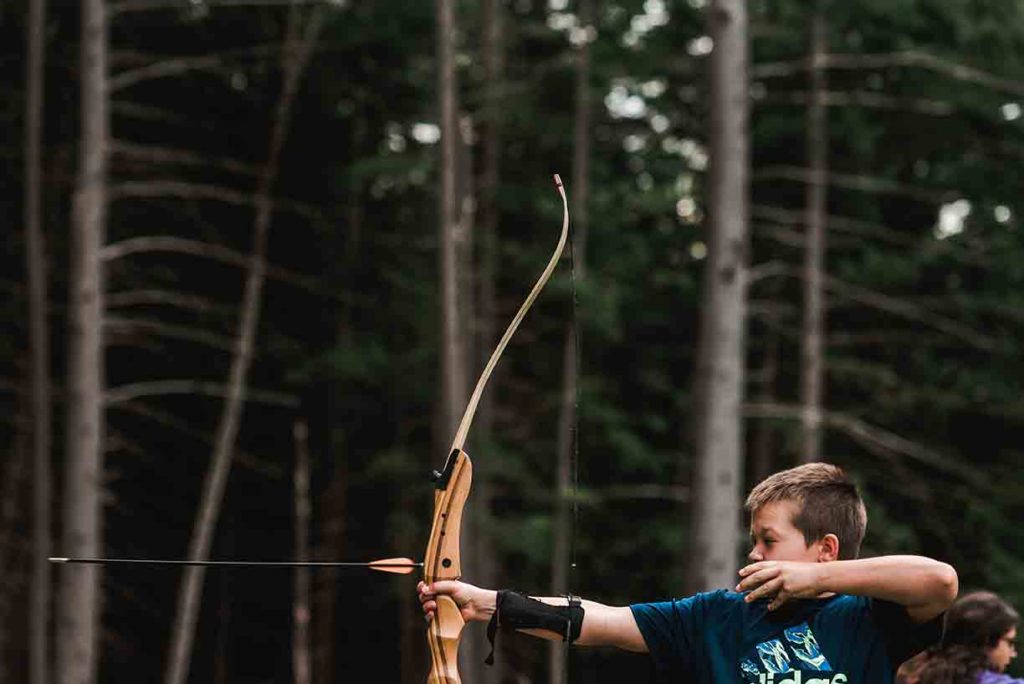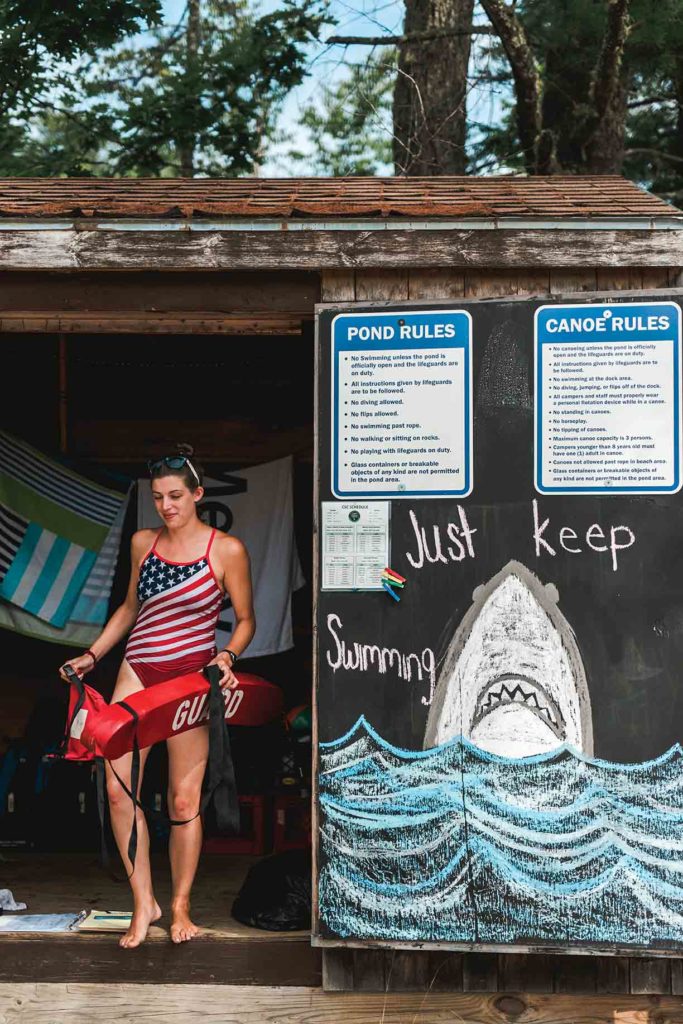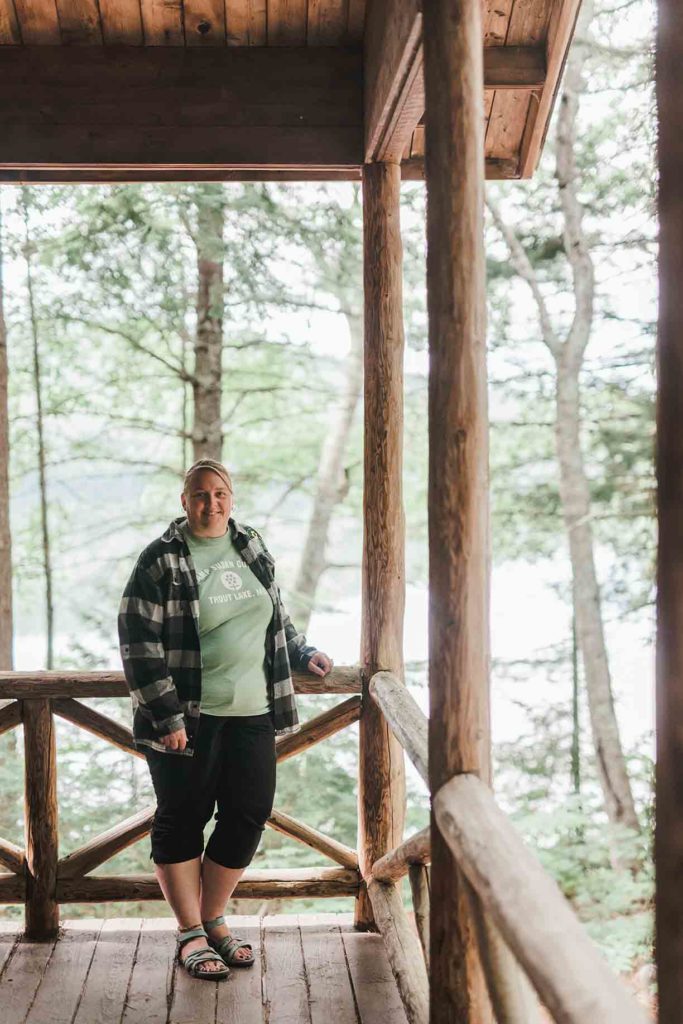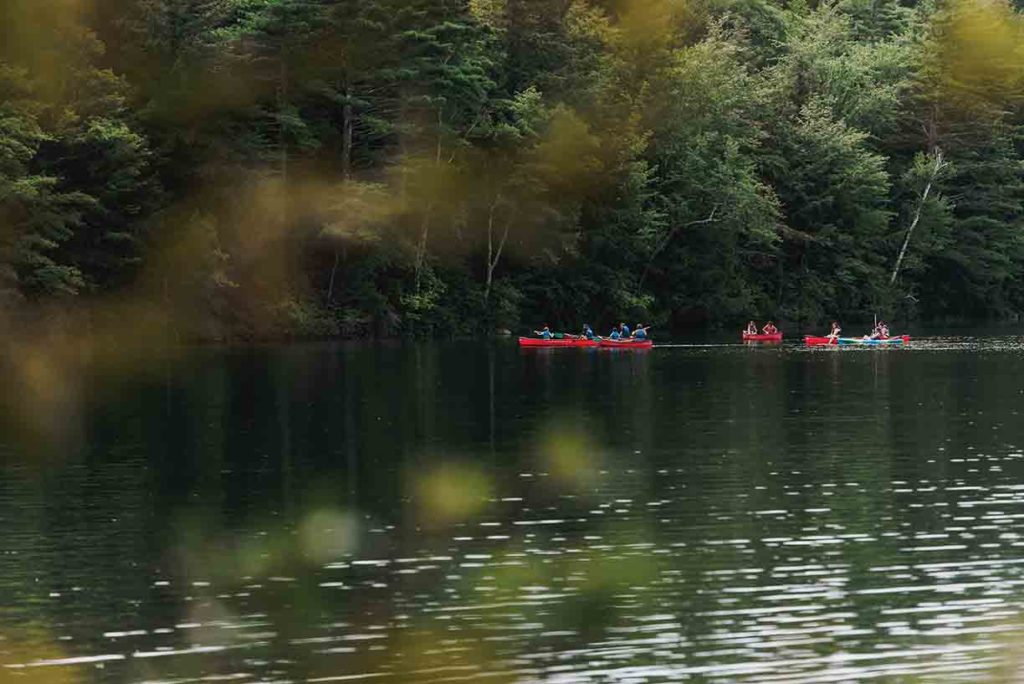Camp Has Made All the Difference
For Susan Curtis campers, two weeks on the shore of Trout Pond means finding new paths

They were half-siblings pulled apart as kids and placed in separate households, one winding through a reel of foster parents, the other living with her grandmother. For the most part, they went about their separate lives—until they met at summer camp.
Their story isn’t as lighthearted as the one we watched in The Parent Trap, but it ends well. It unfolds at a place where waiting lists don’t apply, and a bigger paycheck won’t get you in. Camp Susan Curtis, founded in 1971 by former governor Kenneth Curtis and his wife, Pauline, on 100 acres in Stoneham in western Maine, serves as a haven for Maine’s underserved children to spend two weeks each summer free of judgment and the stigma associated with economic hardship. The only requirement for admission? A reference from a guidance counselor.
“I had no idea that Anthony had been coming here every summer for three years, and he didn’t know I was coming,” says Makenzie Doucette, 19. Her brother, Anthony Stanasek, 16, has been a camper since 2011. That first year, he says, he was a pretty angry little guy. His birth mom was in jail, and his dad was long gone. He rarely saw his sister, and he didn’t want to talk to anybody. “If someone even touched me, I’d get angry,” he recalls. One day when he found himself back in the Camp Susan Curtis offices, Stanasek admitted to camp director Terri Mulks that he was frustrated. He began to open up. “We got pretty close,” says Mulks. “It was really about teaching him to use his words and to get help when he needed it.” As Stanasek began feeling less frustrated, and things like loud noises started being less annoying, he began to notice the other kids at camp had been through a lot too. In fact, one of them, he learned, was his sister. The last time they were living in the same household, she walked him to the store when they’d run out of food. He was four; she was seven and protective. The moment Doucette realized they’d both been attending camp, she switched into Stanasek’s session. “Being able to see him all the time has been amazing,” says Doucette, who’s now a staff member—“a total rock star,” adds Mulks.

Camp was a reunion for half-siblings Makenzie Doucette and Anthony Stanasek. 
Cabins awaiting campers.
For these two and the roughly 500 others attending Camp Susan Curtis each summer, a referral from a school guidance counselor is an invitation to be a kid. Fishing for eels, watching sunsets from the dock, tipping a canoe, roasting marshmallows over a fire, hiking, playing dodgeball, learning to swim—all the perks of summer childhoods in Maine are available to some kids for the first time.
Down a dusty path along a row of adorable, mostly identical brown cabins, a crew of tweens congregates on a porch, one perched on the rail and dangling his feet over the side, others cascading down the stoop. This is the only stable home some of them have known. “We are showing our kids things can be different, and what they can aspire to,” says Mulks, waving to them as she takes a few bumps from behind the wheel of a golf cart.

These 8-to-18-year-olds come from all 16 counties—from the Canadian border towns in the north down to Lubec and over to the Berwicks. Fifteen percent are in foster care, and 8 percent live with a grandparent or another relative. When they are home, some don’t know when they’ll get their next meal, Mulks says. “Families move to campgrounds in the summer so they will be able to afford rent in the colder months,” she says. “Kids come from homes where the drug crisis is alive and well, and some parents are incarcerated.” The camp works with Good Shepherd Food Bank to send campers home with cans of peas and carrots, boxes of macaroni and cheese, and fresh produce. But when they arrive at Camp Susan Curtis “they have a different set of expectations,” Mulks says. In a less structured environment, those diagnosed with autism can learn to socialize, and kids gain confidence to overcome conduct disorders. They play outside and forget about what they don’t have.

Staff waterfront coordinator Melissa Kelly grabs supplies from the shed. 
All smiles on the porch for camper James Terry. 
Campers carrying kayaks to Trout Pond.
“Many kids in Maine can’t go to camp because it’s cost-prohibitive,” says Mulks. Between fund-raising and corporate sponsorships, the Susan L. Curtis Charitable Foundation raises $650,000 to provide a full ride for every camper in four two-week summer sessions, just as originally intended by Kenneth and Pauline Curtis nearly 50 years ago. Kenneth Curtis was governor when his 11-year-old daughter, Susan, died of cystic fibrosis. Donations came pouring in, and at the suggestion of a local police officer, the Curtises, whose second daughter would lose her fight to the disease 25 years later, decided to open a summer camp in Susan’s name. On the pristine conservation land of past summer camps, they would help Maine’s most vulnerable youth overcome the effects of poverty. Kids who qualified for free and reduced-fee lunch programs started rolling in, and they kept coming back. Today, three-fourths are returning campers, and when they reach high school half will enter the camp’s leadership development program, which includes a paid staff apprenticeship. Stanasek is among them. He and his campers have just returned from an overnight up nearby Allen Mountain, where he taught them at least a little about roughing it. “One of them got really tired, so I carried his backpack up, too,” says Stanasek. He’s a different person than the one who arrived at camp eight years ago—you can’t get him to stop talking these days. “You learn to be patient when you’re living in a cabin with young kids,” he says. “They’re always jumping all over you. I’m used to it, though. They look up to me.”

Terri Mulks, director and friend to campers since 2009. 
Wishes come true at Camp Susan Curtis. 
During their time here, campers gain leadership experience.
As the August sun sets, a campfire signifies the end of the final session. All 125 campers circle round. Giggles trail off, and it’s so quiet you could hear the chirp of a chipmunk. Everyone breaks into the Camp Susan Curtis song, and a single flame is lit then passed on, multiplying until each camper is cupping a flickering tea candle on a wood chip. “The spirit of Camp Susan Curtis has spread to every child, and the campfire is a symbol of that,” says Mulks. Each makes a wish and casts off their candle raft onto the water. The shoreline of Trout Pond begins to glow.

Stanasek’s wish has everything to do with the future. Like every child who’s ever attended Camp Susan Curtis, he’ll graduate high school. With the support of his adoptive mom, who was his birth mom’s 12-step program sponsor, he has his sights set on trade school to become an electrician; 80 percent of Susan Curtis campers go on to postsecondary school. “I’ve learned here that, even though I’ve had a rough childhood, I don’t have to go down that same path,” Stanasek says. For now, he’s following in his sister’s footsteps and joining the camp staff this summer.


